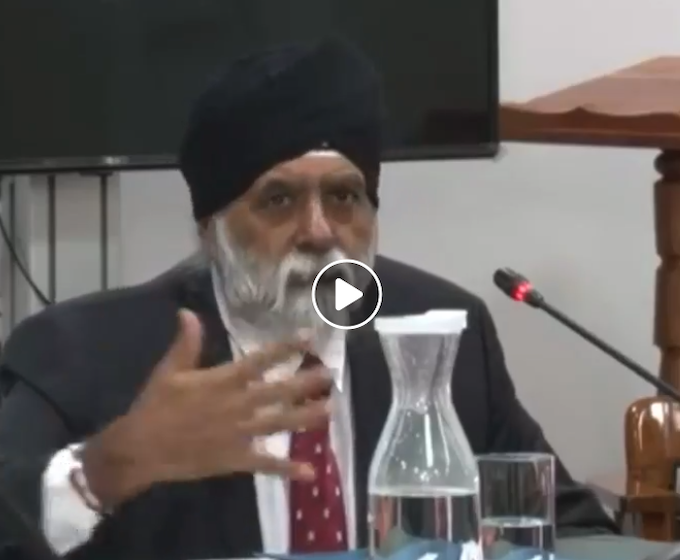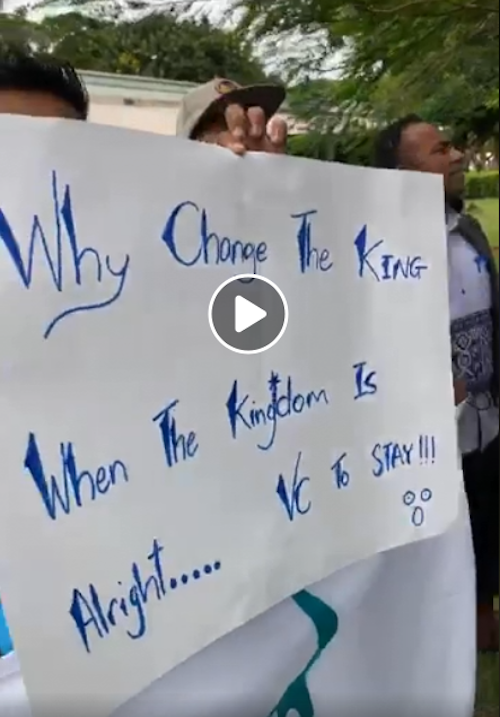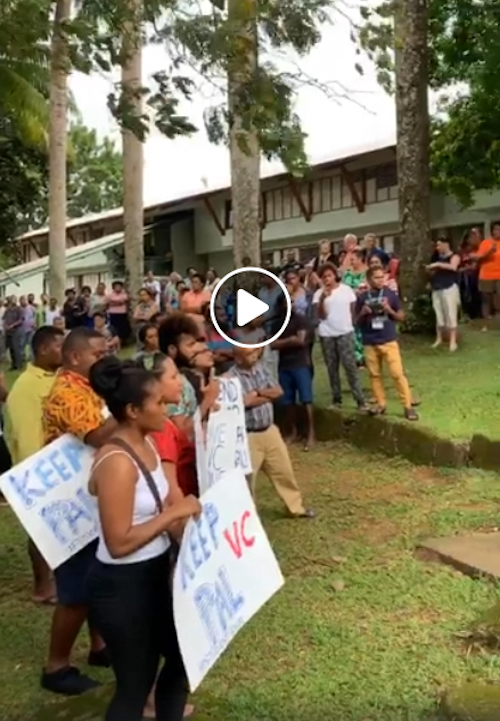
After three days of protests by hundreds of students and staff at the regional University of the South Pacific over the treatment of their popular reforming vice-chancellor, an independent New Zealand journalist has now revealed damning details of previously secret governance reports.
Journalist and author Michael Field has revealed that some academics and staff at USP’s main Laucala campus in Suva “have been paying themselves millions of dollars in salaries and allowances they may not have been entitled to”.
An initial report on documents that have been leaked to him were reported on his social media account today, but further revelations are expected soon in the regional news magazine Islands Business.
READ MORE: Anger over suspension of Pacific university’s vice-chancellor
His revelations came after an executive committee of the USP University Council, the governance body that oversees the 12-nation university, has allegedly violated its own standing rules and suspended Professor Pal Ahluwalia as vice-chancellor and president pending an inquiry into allegations against him.
However, hundreds of academics and students have rallied to Professor Ahluwalia’s support. They see him as a reforming influence trying to establish better governance protocols at the institution, the premier university in the South Pacific region.

Another “pro Pal” protest by USP staff was blocked by police yesterday who said they had not applied for a permit.
Field reports that several Pacific member nations of the USP – including Nauru, New Zealand, Samoa and Tonga – have “expressed anger at the way USP staff appear to be helping themselves to aid money intended to educate the people of the Pacific”.
‘Payments run to millions of dollars’
“The payments which run into the millions of dollars, were paid during the reign of Fiji vice-chancellor Rajesh Chandra who also benefited from various curious allowances,” writes Field.
“They were discovered by his replacement Pal Ahluwalia who took over USP on November 1, 2018.”
A senior USP academic told Pacific Media Watch: “What has happened at USP in the past two days was a [pro-chancellor Winston] Thompson-orchestrated coup against VC Ahluwalia, the USP Council and against Pacific regionalism.
“I wonder who else is lurking in Thompson’s shadows.”
Michael Field said that for his first report today: “I have gone with a lighter version. I will harden up tomorrow. I have, in time honoured fashion received a big pile of key USP documents.”
Some of his revelations are expected to be from the independent Auckland consultants BDO report submitted to the USP Council last August but previously kept secret.
President Lionel Aingimea of Nauru, the incoming chancellor of the university and a law graduate from USP, yesterday accused a small Fiji group, including pro-chancellor Thompson, a retired former Fiji diplomat, of “hijacking” the university and waging a vendetta against Professor Ahluwalia.
Suspended on pay
Islands Business reported that a media statement authorised by Aloma Johansson, deputy pro-chancellor of the USP Council, said that the executive committee had suspended Professor Ahluwalia from duty on pay, and without withdrawal of privileges.

This suspension arose from a report compiled by the chair of the risk and audit committee Mahmood Khan listing numerous incidents of alleged breaches by the vice-chancellor.
Speaking to FBC News today for the first time since his suspension, Professor Ahluwalia said that if “something concrete” comes up from the investigations, it would be a matter for the council to decide.
Professor Derrick Armstrong has been appointed acting vice-chancellor and president to manage university affairs.
However, the USP Students Association (USPSA) has refused to recognise him or to meet with him and pro-chancellor Thompson to discuss the crisis.
Regional opposition has grown louder with Nauru’s President Aingimea calling for an urgent meeting of the full USP Council.
Samoa’s Minister for Education Loau Kaneti Sio has taken it a step further by calling on Thompson to step down.
Investigation commissioned
Minister Sio said President Aingimea should succeed Thompson, who has been at loggerheads with Professor Ahluwalia since the vice-chancellor took office and first raised concerns about governance at the university.
This led to the commissioning of an investigation and a 114-page highly critical report by BDO Auckland.
“It is clear that the relationship between the pro-chancellor and the vice-chancellor has broken down irretrievably, and that the pro-chancellor has not abided by his agreement with council, nor with the sub-committee appointed to oversee the commission, to work with the vice-chancellor for the benefit of the USP,” wrote Minister Sio in a strongly-worded letter.
Emeritus Professor Pat Walsh, who is New Zealand’s representative on the council, also wrote a letter of concern.
As the second-largest funder of USP, after Australia, the New Zealand government has one seat on the USP Council.
Under USP’s own protocols, the executive committee of the council does not investigate the vice-chancellor, so any “meeting which purported to dismiss, suspend or otherwise discipline the VC would have no standing,” warned Walsh.
Australia contributed US$13 million to the USP in 2017, the European Union $1.5 million, Japan $2.3 million and other partners $2 million, according to the USP’s accounts for that year.











































